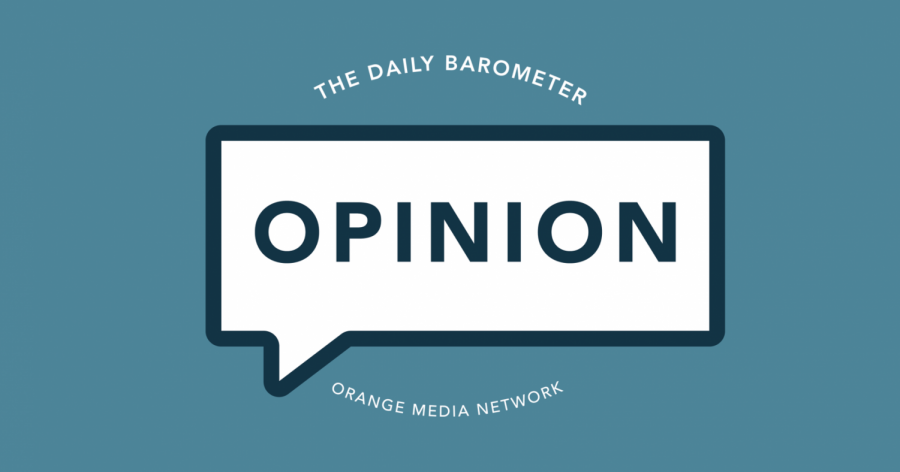Pinheiro da Silva: The problem with elections, and the effect on universities
October 23, 2020
Editor’s Note: This column is a part of the 2020 Elections Issue. The Baro has put together this issue to inform the Oregon State University and greater Corvallis, Ore. communities about the 2020 Elections. This issue will dispel voting myths and include information on local elections, voting methods and tips, candidate profiles, and more. This column does not represent the opinion of The Daily Barometer. This column reflects the personal opinions of the writer.
This election year has been bursting with igniting debates between presidential candidates Donald J. Trump and Joseph R. Biden, full of controversy and the never-ending foul war between Democrats and Republicans.
Voting in the United States has been sort of a taboo for some people, for quite a while. It is fundamental to vote, for those that believe that politics provide change. I find it particularly odd that people choose not to, and in one way or another, prefer to have their decisions made by others.
By international standards, voter turnout in the United States is quite low, according to statistics by the office of the clerk of the U.S. House of Representatives. In 2018, nearly 136 million votes were accounted for, of the 245 million people who are eligible to vote.
This only adds to the amount of people who happen to be unsatisfied with their current government, and also adds fuel to the careless persona spread nationwide. Not that if everyone voted our problems would be solved, but if everyone voted, losses by small margins would be rare and those who believe their voices are never heard might have a chance.
Andrew Harker, student and financial director of the College Democrats at Oregon State University, believes that “voting is a way for you to express your political beliefs and to put your efforts, your ideas, and your morals behind a candidate that you believe in.”
As a college student, I can say that the university environment is affected by the elections on so many levels. Some examples are financial funds, inclusion and the diversity of students. Some politicians promote these things in their policies and speeches, while others try to stifle them.
From a Democrat’s standpoint, Harker said, “Biden has committed, if president, to plans that increase the amount of Pell Grants and the value given in these pell grants and debt forgiveness and for state universities, families who make less than $100,000 would go to college without having to worry about tuition.” I couldn’t agree more, but I also believe that this could bring negative consequences.
College institutions in the United States are expensive, some would say overpriced. This leads to hundreds of thousands of students that have to live in debt for many years after graduating, meanwhile, the money should be going back to the universities, helping to induce a healthy economic cycle.
For Jonathan Stoll, director of career development at OSU, and co-founder of Soul force education, the issue lies in the misinterpretation of the system we live in. “People often mistakenly believe we live in a democracy,” Stoll said via email. “Our political system is a republic. This makes it imperative that we participate in the democratic process of voting and electing those whose job it is to represent our respective interests.”
It is so intrinsic to our ways of exerting citizenship, that we use the power of voting – and the youth of universities like OSU should be, more than anyone else, interested in exerting this power –and advocating for what they believe will bring change, regardless of whom their candidates are.
On a different note, about diversity and inclusion, Stoll said, “Diversity of thought. Different perspectives. If there’s anywhere in the country where difficult dialogues must occur, it has to be an institution of higher education”
The US is a huge cluster of different ethnicities, races and, therefore, perspectives. At OSU, for example, according to College Factual’s database, around 11% of the whole student body is composed by international students, contributing culturally, intellectually and financially to the whole university.
In a 2017 article by CNBC, regarding changes in budgets by Donald Trump, in comparison to former presidents of the United States, Barack Obama and George W. Bush, there was nearly $10 billion in losses for the education sector.
For OSU, it is no different; as a state university, this money can go towards research, university promotion, advancements on faculty members and overall investments into the infrastructure, such as laboratories, the library, dining and housing services and into improving essentially all administrative groups of faculty.
Trump has been, in many ways, counterproductive for this country, with the downplay of the COVID-19 pandemic, the disbelief in science and the short-minded bigotry presented in many of his speeches.
This disbelief in science walks hand in hand with his downplay of the pandemic, and also is inherently connected to universities like OSU, that have a strong base in engineering and biology schools.
The study that goes behind learning things like climate change and pandemics is basically entirely done by people that come from these universities, and thus, supporting those that believe in education is more important than ever before.















































































































